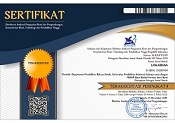MODEL PEMBELAJARAN BERPIKIR INDUKTIF UNTUK MENINGKATKAN KEMAMPUAN MENERAPKAN VOKAL É, E, DAN EU DALAM MENULIS PENGALAMAN
Abstract
Penelitian ini dilatarbelakangi oleh kurangnya kemampuan siswa menerapkan vokal é, e, dan eu dalam menulis pengalaman. Penelitan ini bertujuan untuk mendeskripsikan: 1) kemampuan menerapkan vokal é, e, dan eu dalam menulis pengalaman siswa kelas VII-I SMP Negeri 29 Bandung tahun ajaran 2013/2014 sebelum menggunakan model pembelajaran berpikir induktif; 2) kemampuan menerapkan vokal é, e, dan eu dalam menulis pengalaman siswa kelas VII-I SMP Negeri 29 Bandung tahun ajaran 2013/2014 setelah menggunakan model pembelajaran berpikir induktif; 3) perbedaan kemampuan menerapkan vokal é, e, dan eu dalam menulis pengalaman siswa kelas VII-I SMP Negeri 29 Bandung tahun ajaran 2013/2014 sebelum dan setelah menggunakan model pembelajaran berpikir induktif. Metode yang digunakan dalam penelitian ini adalah kuasi eksperimen, serta desain penelitiannya adalah pre-test and post-test group. Berdasarkan hasil penelitian, dapat disimpulkan bahwa: 1) kemampuan menerapkan vokal é, e, dan eu dalam menulis pengalaman siswa kelas VII-I SMP Negeri 29 Bandung tahun ajaran 2013/2014 sebelum menggunakan model pembelajaran berpikir induktif dikatagorikanC (cukup), dengan rata-rata 66,38%; 2) kemampuan menerapkan vokal é, e, dan eu dalam menulis pengalaman siswa kelas VII-I SMP Negeri 29 Bandung tahun ajaran 2013/2014 setelah menggunakan model pembelajaran berpikir induktif dikatagorikan B (baik), dengan rata-rata 77,83%; serta 3) ada perbedaan yang signifikan antara kemampuan menerapkan vokal é, e, dan eu dalam menulis pengalaman siswa kelas VII-I SMP Negeri 29 Bandung tahun ajaran 2013/2014 sebelum dan setelah menggunakan model pembelajaran berpikir induktif yang terlihat dari hasil gainnya yaitu 11,45%. Hasil uji hipotesis pun menunjukan > , yaitu4,60 > 2,76 yang artinya hipotesis kerja ( ) diterima dan hipotesis nol ( ) ditolak. Jadi, model pembelajaran berpikir induktif dapat meningkatkan kemampuan menerapkan vokal é, e, dan eu dalam menulis pengalaman siswa kelas VII-I SMP Negeri 29 Bandung tahun ajaran 2013/2014.
Abstract
This research is triggered by lack of student ability to apply vocal é, e, and eu in the writing experience. This research aims to describe: 1) the ability to apply the vocal é, e, and eu in the writing students experience at class VII-I SMP Negeri 29 Bandung academic year 2013/2014 before using the learning modelof inductive thinking; 2) the ability to apply vocal é, e, and eu in the writing students experience at class VII-I SMP Negeri 29 Bandung academic year 2013/2014 after using the learning model of inductive thinking; 3) The differences of ability to apply vocal é, e, and eu in the writing students experience at class VII-I SMP Negeri 29 Bandung academic year 2013/2014 before and after using the learning model of inductive thinking. The method used in this research is an experiment quasi and then this research design is the pre-test and the post-test group. Based on the results, it can be concluded that: 1) the ability to apply vocal é, e, and eu in the writing students experience at class VII-I SMP Negeri 29 Bandung academic year 2013/2014 before using the learning model of inductive thinking is categorized C (enough), with an average 66,38%; 2) the ability to apply vocal é, e, and eu in the writing students experience at class VII-I SMP Negeri 29 Bandung academic year 2013/2014 after using the learning model of inductive thinking is categorized B (good), with an average 77,83%, and 3) there is a significant difference between the ability to apply vocal é, e, and eu in the writing students experience at class VII-I SMP Negeri 29 Bandung academic year 2013/2014 before and after using the learning model of inductive thinking that can be seen from its gain result is 11,45%. The result of the hypothesis test represents the value > is 4,60 > 2,76 which means that the working hypothesis ( ) is accepted and the null hypothesis ( ) is rejected. Therefore, thelearning model of inductive thinking can improve the ability to apply vocal é, e, and eu in the writing students experience at class VII-I SMP Negeri 29 Bandung academic year 2013/2014.
Keywords
Full Text:
PDFReferences
Arikunto, S. (2010) Prosedur Penelitian Suatu Pendekatan Praktik. Edisi revisi 2010. Jakarta: Rineka Cipta.
Dinas Pendidikan Provinsi Jawa Barat. (2007) Standar Kompetensi dan Kompetensi Dasar Mata Pelajaran Bahasa dan Sastra Sunda. Bandung: Disdik Jabar.
Tarigan, H. G. (2008) Menulis Sebagai Suatu Keterampilan Berbahasa. Bandung: Angkasa.
Huda, M. (2013) Model-model Pengajaran dan Pembelajaran (Isu-isu Metodis dan Paradigmatis). Yogyakarta: Pustaka Pelajar.
Joyce, B., Weil, M., & Calhoun, E. (2011) Models of Teaching (Model-model Pengajaran). Edisi kedelapan. Yogyakarta: Pustaka Pelajar.
DOI: https://doi.org/10.17509/jlb.v5i2.15947
Refbacks
- There are currently no refbacks.
Copyright (c) 2019 LOKABASA

This work is licensed under Creative Commons Attribution-ShareAlike 4.0 International License.










